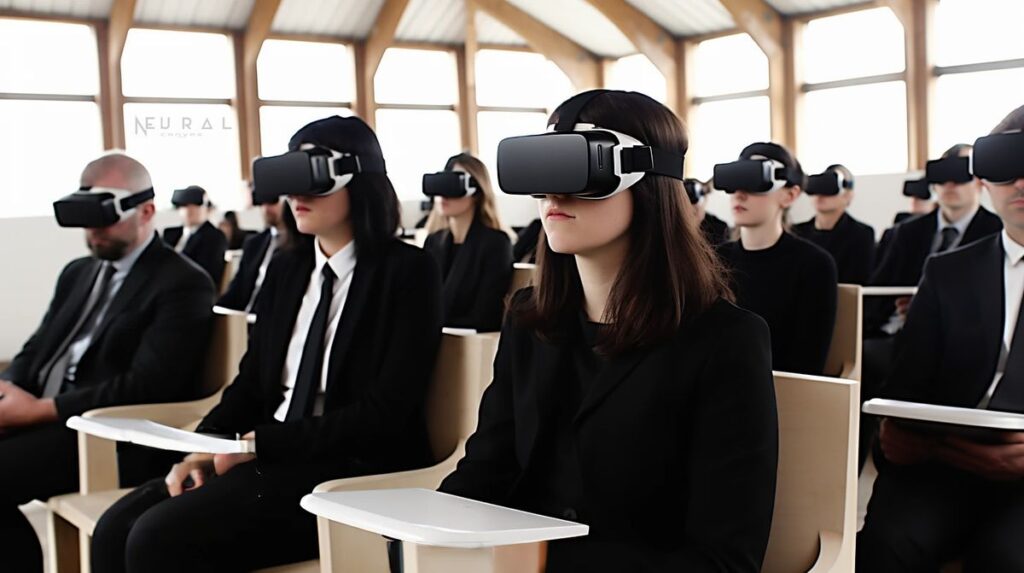The eyewear industry is undergoing a significant transformation, with Lenskart at the forefront of this change. By integrating cutting-edge technology into every aspect of the eyewear shopping experience, from the initial search to the final purchase, Lenskart is setting a new standard for convenience and personalization. This article explores the various dimensions of this revolution, highlighting the digital, technological, and sustainable trends that are reshaping the future of eyewear retail.
Key Takeaways
- Lenskart is pioneering the digital transformation of eyewear shopping by utilizing omnichannel strategies, social commerce, and virtual try-on technology to enhance customer experience.
- The company is pushing the boundaries of personalization with machine learning for custom recommendations, AI-powered smart glasses, and facial recognition for better eyewear selection.
- Sustainability and multifunctionality are becoming increasingly important in the eyewear industry, with consumer demand for eco-friendly glasses and innovations in multifunctional eyewear on the rise.
- Lenskart is exploring the metaverse as a new frontier for eyewear retail, creating virtual shopping experiences and building brand loyalty through immersive events.
- The future of remote work and telepresence in eyewear retail is being shaped by Lenskart’s approach to online customer engagement and the synergy between online and offline channels.
The Digital Transformation of Eyewear Shopping

Embracing Omnichannel Strategies
In the evolving landscape of eyewear retail, omnichannel strategies have become pivotal. Lenskart’s technology-driven approach exemplifies this shift, ensuring a seamless transition between online and offline channels. This integration not only provides consistency but also enhances the overall shopping experience for customers.
By leveraging omnichannel strategies, retailers can meet customers where they are, whether that’s in-store, online, or through social commerce platforms.
The focus on a product-centric marketing strategy, as noted by Khurana, emphasizes the diverse range of eyewear that can enhance various aspects of consumers’ lives. This approach moves beyond mere pricing or promotions, aiming to educate consumers about the value and utility of their products.
- Innovation in retail and e-commerce
- Emphasis on consumer education
- Integration of social commerce
- Consistent customer journey across all touchpoints
The Role of Social Commerce
In the realm of eyewear retail, social commerce has emerged as a pivotal element in connecting with customers on a more personal level. Lenskart’s social commerce commitment fosters connections with consumers through authenticity and social responsibility. By integrating social commerce, Lenskart not only taps into the zeitgeist of digital consumerism but also establishes a presence within niche communities.
The company’s approach to social commerce is not just about selling products; it’s about creating a community and enriching the customer experience.
Lenskart’s technology-driven approach ensures a seamless transition between online and offline channels, enhancing the overall shopping experience. This integration is crucial for catering to the modern consumer who values convenience and fluidity across shopping platforms.
- Deepening engagement with specific customer segments
- Tailoring products and marketing to align with subcultures and enthusiasts
- Becoming an integral part of communities through authentic interactions
The evolution of social interactions within the digital space, particularly through advanced technologies like virtual reality, offers a glimpse into the future of social connectivity and commerce.
Enhancing the Online Experience with Virtual Try-Ons
The advent of Virtual Try-On Technology has been a game-changer for online eyewear retailers. Customers can now enjoy the convenience of trying on glasses from the comfort of their own homes. This innovative feature uses a combination of artificial intelligence (AI) and augmented reality (AR) to provide a realistic representation of how different frames will look on their face, addressing the common hesitation associated with online purchases.
The seamless integration of this technology into online platforms has significantly improved user engagement. It has effectively reduced the uncertainty that customers feel when shopping for eyewear online, leading to higher satisfaction rates and a boost in confidence during the selection process.
The impact of virtual try-on tools extends beyond just user satisfaction. Retailers have observed a notable decrease in return rates, as customers are more likely to be content with their purchase after virtually trying it on. This not only benefits the consumer by saving time and effort but also helps retailers by reducing the costs associated with returns and exchanges.
Personalization Through Technology

Machine Learning for Custom Recommendations
The integration of machine learning into online eyewear sales tools is revolutionizing how consumers find the perfect pair of glasses. By analyzing facial features and previous purchase history, these advanced algorithms can suggest styles and frames that are more likely to appeal to individual tastes and fit requirements.
- Personalization: Machine learning algorithms provide tailored recommendations, enhancing customer satisfaction.
- Efficiency: Reduces the time customers spend searching for the right product.
- Accuracy: Improves the chances of a customer finding a frame that fits well and suits their style.
The proactive use of machine learning not only simplifies the decision-making process for consumers but also represents a significant step towards a more personalized shopping experience.
This technology taps into the power of data to create a shopping experience that feels bespoke. As machine learning continues to evolve, the potential for even more finely tuned recommendations grows, promising a future where every online eyewear purchase feels like it was curated just for you.
AI-Powered Smart Glasses
The advent of AI-powered smart glasses marks a significant leap in wearable technology, seamlessly integrating the digital with the physical realm. These glasses offer an unprecedented level of immersion, allowing users to access virtual environments, interact with avatars, and enjoy interactive experiences like never before.
The potential for personalization with AI-powered smart glasses is immense, paving the way for a more inclusive digital ecosystem that caters to a broad spectrum of user needs.
The table below showcases a comparison of different smart glasses based on their design, connectivity, field of view (FOV), resolution, and price, highlighting the diversity in options available to consumers:
The technological advancements in AI-powered smart glasses foster innovative solutions and enhanced connectivity, which are crucial for the evolving needs of modern consumers.
The Impact of Facial Recognition on Eyewear Selection
The integration of facial recognition technology into online eyewear sales tools is revolutionizing how consumers select glasses that suit their features. By analyzing facial dimensions and shapes, these advanced systems can suggest frames that complement an individual’s unique appearance. This not only enhances the customer experience but also increases the likelihood of satisfaction with the purchased product.
The use of facial recognition for eyewear selection is a testament to the personalized and innovative approaches that are becoming standard in the digital retail space.
Facial recognition technology also helps to streamline the selection process by narrowing down choices from an overwhelming array to a curated selection. Here’s how it typically works:
- The customer uploads a photo or uses their webcam.
- The system analyzes key facial features.
- It matches the customer’s face shape with ideal frame shapes.
- The tool suggests a range of suitable frames.
This technology not only caters to aesthetic preferences but also takes into account the functional needs of the wearer, such as frame fit and comfort. As the market for eyewear continues to grow, with a projected CAGR of 8.1%, the demand for such personalized shopping experiences is expected to rise correspondingly.
Sustainable and Multifunctional Eyewear Trends
The Rise of Eco-Friendly Glasses
The eyewear industry is witnessing a significant shift as environmentally-aware consumers are increasingly seeking sustainable options. Brands are responding by using recyclable or biodegradable materials and implementing sustainable practices like take-back programs and local production. This trend is not just about the materials but also encompasses the entire ethos of a brand, from sustainable packaging to inclusive hiring and donation initiatives.
Innovative companies like SKRP are at the forefront, turning reclaimed skateboard decks and snowboards into stylish sunglasses. Each pair is handcrafted with attention to detail, featuring UV400 polarized lenses and flexible hinges, all while promoting a circular economy.
The demand for eco-friendly eyewear is part of a larger movement towards sustainability in fashion and technology. As Optigrid notes, key trends shaping the future of eyewear include smart eyewear, customization, and eco-friendly practices. This movement is not only driven by consumer demand but also by a genuine commitment from brands to reduce their environmental footprint.
The surge in eco-consciousness is reshaping the eyewear market, with a clear consumer preference for brands that align with their values. As the industry evolves, these sustainable practices are becoming not just a niche trend, but a standard that companies strive to meet.
Innovations in Multifunctional Eyewear
The eyewear industry is witnessing a surge in multifunctional eyewear, catering to a diverse range of consumer needs beyond traditional vision correction. These innovative products are not just about aesthetics; they incorporate advanced features that align with the digital lifestyles of consumers. For instance, some eyeglasses now offer augmented reality overlays, spatial audio, and even eye tracking capabilities.
As the demand for functional eyewear grows, companies are exploring ways to integrate more features into their products. This includes UV protection, which has become a standard expectation for many consumers seeking to protect their eyes from sun damage. The table below showcases a variety of multifunctional eyewear features and their respective examples:
The improved accessibility and personalization potential of these glasses are revolutionizing the way we think about eyewear. They are not just tools for vision correction but are becoming integral parts of our digital lives, enhancing connectivity and collaboration.
With the integration of AI and smart technologies, eyewear is evolving into a platform that offers both style and substance. This evolution is driven by consumer preferences for customization and the impact of digital lifestyles, as highlighted by Optigrid’s exploration into market trends.
Consumer Demand for Sustainable Practices
The eyewear industry is witnessing a significant shift as environmentally-aware consumers are increasingly seeking sustainable options. This trend is not just about the materials used, such as recyclable or biodegradable components, but also encompasses the entire ethos of a brand. Consumers are now more vigilant about companies that adopt comprehensive sustainable practices, including take-back programs, local production, and sustainable packaging.
The future of eyewear is being shaped by a strong consumer demand for brands that not only talk about sustainability but also actively integrate it into their business models.
In response to this demand, innovative companies are emerging with unique approaches to eco-friendly eyewear. For instance, Canada-based SKRP utilizes reclaimed skateboard decks to create stylish sunglasses, combining sustainability with cutting-edge eyewear technology. This is just one example of how the evolution of eyewear is being driven by a blend of technology, customization, and environmental consciousness.
The table below highlights the estimated market segment for spectacle lenses in Canada, indicating the economic potential of sustainable eyewear:
The Metaverse: A New Frontier for Eyewear Retail
Integrating Metaverse Glasses into Retail
The advent of metaverse glasses is transforming the retail landscape, offering a blend of physical and digital shopping experiences. These glasses enable consumers to immerse themselves in 3D virtual stores, where they can interact with products in a way that closely mimics real-life shopping. The seamless integration of virtual and physical worlds through metaverse technology allows for a natural and intuitive navigation, enhancing the overall customer journey.
Businesses are now able to provide personalized shopping experiences, leveraging the capabilities of metaverse glasses to offer tailored recommendations and host exclusive virtual events. This not only revolutionizes the consumer experience but also opens up new avenues for creating impactful brand interactions. The personalization extends to avatars and environments, reflecting the unique preferences of each user and fostering a deeper connection with the brand.
The integration of metaverse glasses into retail is not just about the novelty; it’s about crafting a future where shopping is more engaging, interactive, and personalized.
As the technology evolves, users are finding themselves participating in virtual concerts, exploring simulated worlds, and engaging in social interactions with a heightened sense of presence. This marks a significant shift in how retail businesses approach customer engagement and brand loyalty.
Creating Virtual Shopping Experiences
The advent of metaverse glasses is transforming the retail landscape, offering a seamless blend of the physical and digital worlds. Customers can now enjoy a highly interactive and engaging shopping experience from the comfort of their own homes. By donning these advanced glasses, they are transported into 3D virtual stores where they can explore and interact with products in a way that closely mimics a real-life shopping trip.
The integration of VR and AR technologies into the metaverse glasses has been a game-changer, enabling consumers to visualize products in their actual environment and make informed decisions.
Businesses are leveraging this technology to not only revolutionize the shopping experience but also to foster stronger connections with their customers. Personalized recommendations and exclusive virtual events are becoming the norm, enhancing consumer engagement and building brand loyalty. This digital innovation opens up new avenues for interactive collaboration and community building, reshaping how we perceive and engage with e-commerce.
The table below outlines the key benefits of virtual shopping experiences enabled by metaverse glasses:
Building Brand Loyalty through Immersive Events
The advent of immersive events in the metaverse is a game-changer for eyewear brands looking to foster deep connections with their customers. By hosting virtual gatherings and creative collaborations, brands can create a sense of community and belonging that resonates with the digital-native consumer.
The metaverse offers a unique platform for brands to deliver personalized experiences and build loyalty through exclusive events and interactions.
These experiences are not just about showcasing products but also about creating a narrative that participants can engage with. The table below highlights the potential benefits of immersive events for brand loyalty:
As the line between digital and physical continues to blur, the importance of such innovative approaches to customer engagement will only grow. Brands that leverage the power of immersive events are poised to not only captivate but also retain a loyal customer base in the evolving landscape of eyewear retail.
The Future of Remote Work and Telepresence
Lenskart’s Approach to Online Customer Engagement
Lenskart has harnessed the power of digital innovation to create a seamless online journey for its customers. The brand’s app not only showcases new collections and provides personalized recommendations but also features a virtual try-on system, allowing customers to visualize how different eyeglasses will look on them before making a purchase. This integration of technology has been pivotal in merging the online and offline worlds, encouraging users to visit physical stores for services like prescription updates.
Lenskart’s strategy goes beyond just selling eyewear; it’s about creating a cohesive ecosystem where customers can enjoy a consistent and convenient shopping experience across all channels.
The company’s foray into social commerce is a testament to its commitment to customer engagement. By aligning its products and marketing efforts with various subcultures and communities, Lenskart has positioned itself as more than just a retailer—it’s a brand that resonates with the lifestyles and passions of its consumers.
- Online discovery through social media and word of mouth
- Virtual try-on and personalized recommendations via the app
- Encouragement of offline interactions for additional services
- Integration of social commerce to engage specific customer segments
The Synergy of Online and Offline Channels
The retail landscape is witnessing a transformative synergy between online and offline channels, particularly in the eyewear industry. Lenskart’s technology-driven approach ensures a seamless transition for customers, providing a consistent and convenient shopping experience across both platforms. This integration is not just about convenience; it’s about creating a comprehensive ecosystem that caters to all aspects of eyewear shopping.
- Seamless Transition: Customers can move between online browsing and in-store fittings without friction.
- Consistent Experience: Brand messaging and customer service remain uniform across all channels.
- Enhanced Accessibility: Integration allows for wider reach, ensuring that no customer is left behind due to geographical or physical constraints.
The integration of advanced technologies with traditional retail methods is reshaping the eyewear industry, offering a glimpse into the future of social connectivity and inclusive user-centric eye care solutions.
Virtual Fittings and the Future of Remote Eyewear Consultations
The landscape of eyewear consultations is undergoing a significant shift with the advent of virtual fittings. These innovative solutions offer a glimpse into the future where remote consultations are not just a possibility, but a preferred choice for many.
- Revolutionary eyeglasses fitting software solutions are transforming optometry with Topology Eyewear, OptikamPad, FittingBox, Smart Mirror by ABS, and PupilFit AI. Customized, precise, and interactive experiences redefine eyewear selection.
The integration of virtual reality and metaverse glasses into telehealth platforms is a game-changer. It enables remote consultations with specialists and personalized therapeutic interventions, making the process more efficient and tailored to individual needs.
The use of metaverse glasses extends beyond healthcare, offering new ways to engage in remote work and telepresence. The ability to join virtual meetings with avatars that mimic physical presence is revolutionizing the way we think about work and collaboration in the digital age.
As we navigate the evolving landscape of the workplace, the future of remote work and telepresence is becoming increasingly integral to our professional lives. Embrace the cutting-edge solutions that make working from anywhere seamless and efficient. Discover more about how you can transform your work experience by visiting our website. Don’t miss out on the latest insights and tools that can empower your remote work journey. Click here to learn more and stay ahead in the telecommuting revolution.
Conclusion
In conclusion, the advent of online sales tools like Lenskart’s platform is a testament to the transformative impact of technology on the eyewear industry. By addressing common customer pain points and leveraging advancements such as AI, virtual try-ons, and metaverse glasses, Lenskart has not only streamlined the shopping experience but also bridged the gap between digital convenience and physical retail. As they continue to innovate with a product-centric approach and a vision for a more personalized customer experience, Lenskart stands as a beacon of tech-driven progress in retail. The future of eyewear shopping is here, and it is clear, convenient, and customized, thanks to pioneers like Lenskart who are redefining the landscape with every frame sold.
Frequently Asked Questions
How is Lenskart revolutionizing the eyewear shopping experience?
Lenskart is transforming eyewear shopping by leveraging technology and innovation to enhance customer experiences. They use an omnichannel approach, virtual try-ons, machine learning for personalized recommendations, and AI-powered smart glasses to bridge the gap between online and offline retail.
What are some of the technology-driven solutions introduced by Lenskart?
Lenskart has introduced several tech-driven solutions such as virtual try-ons, machine learning algorithms for custom eyewear recommendations, and AI-powered smart glasses. These innovations aim to address common pain points in eyewear shopping, such as size, prescription, and aesthetics.
What is the role of social commerce in Lenskart’s strategy?
Social commerce plays a significant role in Lenskart’s strategy. The company focuses on product-centric marketing, educating consumers about the diverse range of eyewear options through social media and other platforms, rather than emphasizing pricing or promotions.
How does Lenskart plan to enhance personalization for customers?
Lenskart aims to enhance personalization by utilizing machine learning to recommend eyewear based on facial features and past purchases. This proactive approach is designed to simplify the decision-making process for consumers and provide a more personalized shopping experience.
What are the sustainable and multifunctional eyewear trends that Lenskart is tapping into?
Lenskart is tapping into the rising demand for sustainable and multifunctional eyewear. They are addressing the growing environmental consciousness among consumers by offering eco-friendly glasses and innovating in multifunctional eyewear that caters to various consumer needs.
How are metaverse glasses changing the retail landscape for eyewear?
Metaverse glasses are changing the retail landscape by providing immersive virtual shopping experiences. These glasses allow consumers to explore 3D virtual stores, interact with products, and visualize items in real life, thus enhancing consumer engagement and brand loyalty.

I am a seasoned software engineer with over two decades of experience and a deep-rooted background in the optical industry, thanks to a family business. Driven by a passion for developing impactful software solutions, I pride myself on being a dedicated problem solver who strives to transform challenges into opportunities for innovation.
